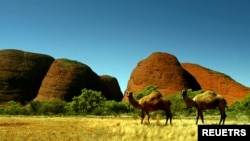Aboriginal groups have criticized a new law intended to protect cultural heritage in Western Australia. The legislation was approved following the then-legal destruction of sacred 46,000-year-old indigenous caves last year by a mining company.
The ancient caves at Juukan Gorge in the remote Pilbara region of Western Australia were legally destroyed last year by iron ore miner Rio Tinto despite opposition from Aboriginal groups. They insisted the site was sacred and should have been protected.
Western Australia’s heritage laws have now been changed to prevent a similar disaster. A new Aboriginal Cultural Heritage Council will oversee the new system.
But there are concerns because the legislation passed Wednesday allows the state government to make a final decision if there’s a disagreement between indigenous leaders and mining companies over whether a particular site should be protected.
Hannah McGlade is a human rights lawyer. She told the Australian Broadcasting Corp. that the legislation is flawed.
"Non-indigenous mining proponents (and) developers have several rights of review throughout the Act if they are aggrieved by various issues, but when it comes to this most important issue for Aboriginal people about wanting to protect a heritage or cultural site, there is no merits review provided," McGlade said. "And the law society of West Australia in their recent submission on the bill provided to the government said they believed this effectively amounts to racial discrimination in law. And it is not about Aboriginal empowerment. It is the minister’s decision at the end of the day.”
Some indigenous leaders do support the new law.
The Western Australian government has insisted it will protect First Nation landscapes and ancestral remains.
State premier Mark McGowan said in a statement the legislation is a “historic and significant reform” that would support the “empowerment of Aboriginal people.” He also spoke of the need to find a balance between protecting cultural heritage and realizing “the economic potential of natural resources.”
Australia’s indigenous culture has existed for some 65,000-years. Aboriginal people make up about 3% of the national population.
Land lies at the heart of their customs and is central to First Nations’ beliefs around creation.




